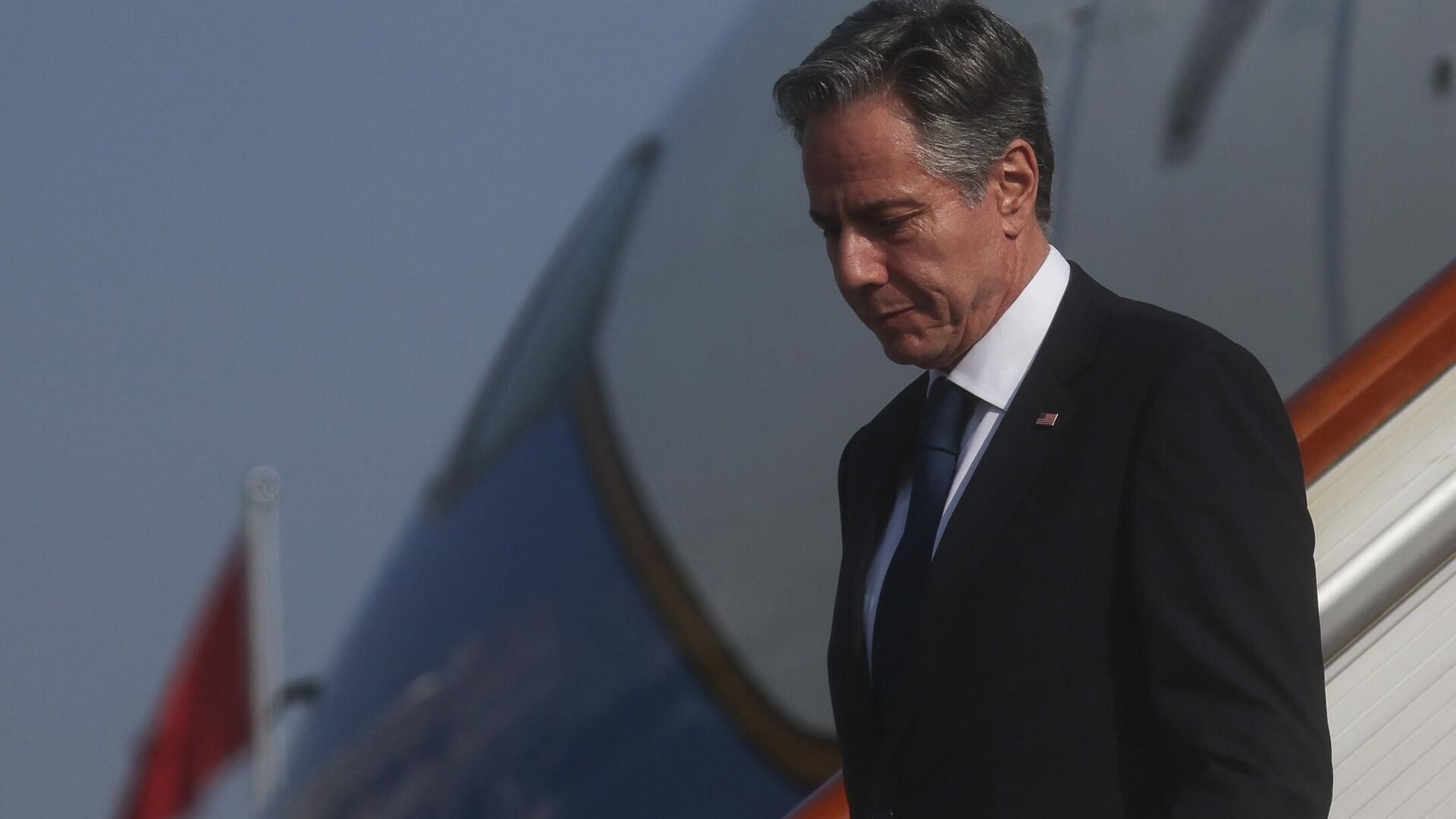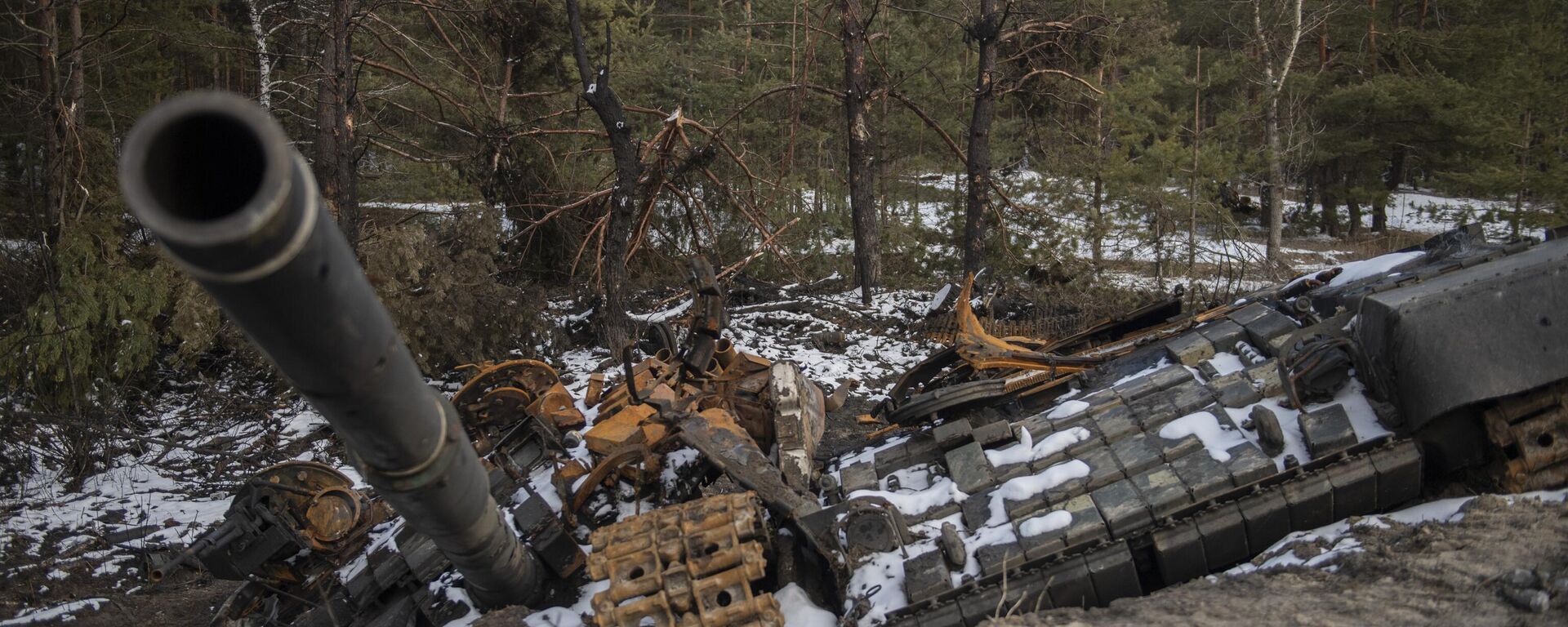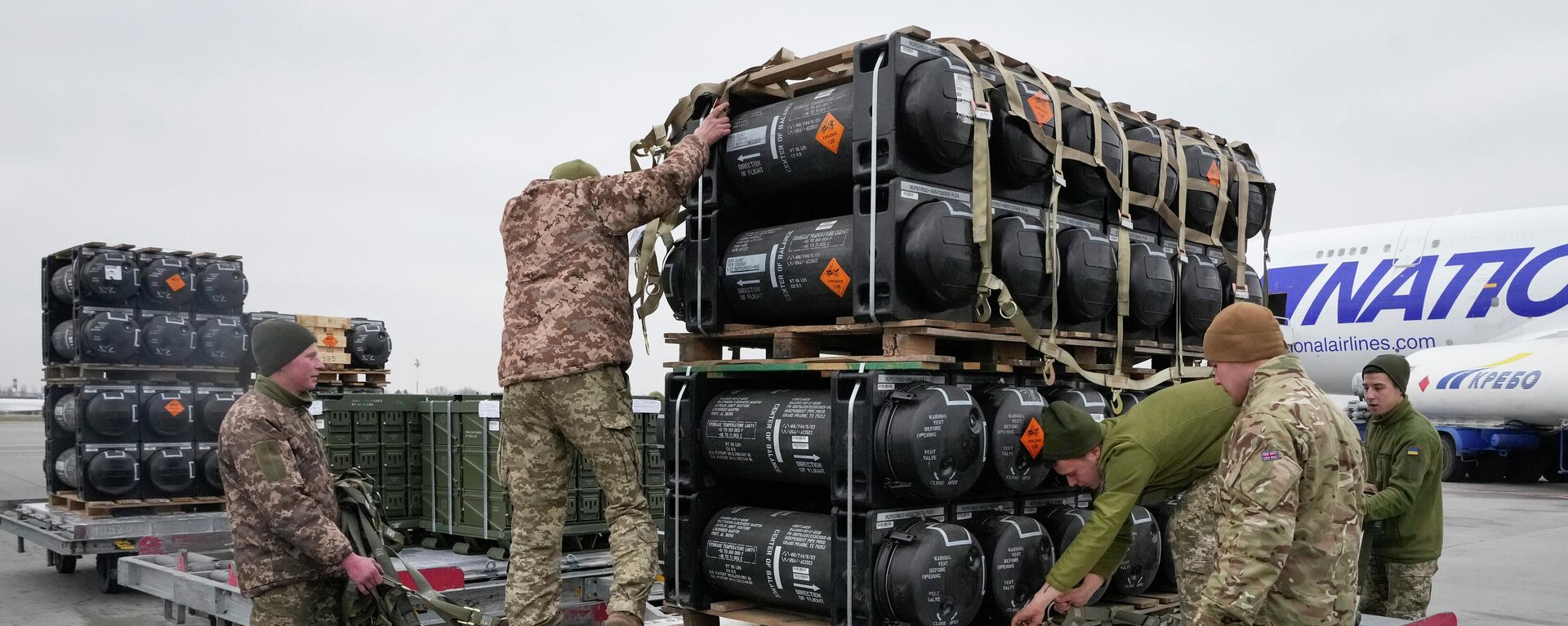https://sputnikglobe.com/20230621/long-costly-legal-battle-awaits-attempt-to-seize-frozen-russian-assets-for-ukraine-reconstruction-1111370843.html
‘Long, Costly’ Legal Battle Awaits Attempt to Seize Frozen Russian Assets for Ukraine Reconstruction
‘Long, Costly’ Legal Battle Awaits Attempt to Seize Frozen Russian Assets for Ukraine Reconstruction
Sputnik International
The EU claims to have more than €200 billion in Russian assets frozen in its members’ banks. Spurred on by Kiev, there have been several threats and attempts to seize that money and give it to Ukraine - so far with no avail.
2023-06-21T18:07+0000
2023-06-21T18:07+0000
2023-06-21T18:07+0000
world
jacques sapir
ukraine
european union (eu)
membership action plan
nato
world bank
reconstruction
https://cdn1.img.sputnikglobe.com/img/07e7/06/12/1111256209_0:113:2168:1333_1920x0_80_0_0_f5d9f995e229bbe0906c7ec2edcf417b.jpg
At a conference in London on Wednesday, several Western countries backing Ukraine pledged a total of several billion dollars toward rebuilding Ukraine that will ostensibly pave the way for the country’s incorporation into the European Union and the NATO alliance.Delegates from some 60 countries attended the Ukraine Recovery Conference, which saw funding pledges that included a $1.3 billion pledge from Washington, $305 million in aid and £3 billion (over $3.8 Bln) in World Bank loan guarantees from London, and $416 million from Berlin, alongside investment pledges by dozens of major multinational corporations such as BlackRock, JPMorgan Chase, and Hyundai Engineering.According to World Bank estimates, the costs of reconstruction exceeded $411 billion as of February 2023. Not included in those estimates are the destruction in front-line cities like Artemovsk (Ukrainian: Bakhmut) where battle has raged in recent months, or the numerous destroyed villages downstream from the Kakhovka dam that was blown up on June 6, triggering extensive flooding along the lower Dneper River.Preparing Kiev for EU, NATOBrussels has said it hopes to incorporate Ukraine into the bloc one day, but that is many years away as Kiev faces numerous hurdles, including problems of corruption and judiciary reform, to say nothing of its present conflict with Moscow.NATO, a separate military alliance also headquartered in the Belgian capital, also has plans to add Ukraine to its membership, although it has similar standards regarding liberal democratic government, corruption, and a resolution of internal and external conflicts that make its addition in the near future unlikely at best.That said, London indicated on Wednesday that it would support waiving those standards in the case of Kiev, with UK Foreign Secretary James Cleverly stating that “many of the requirements of the Membership Action Plan are actually being delivered” by Ukraine - including, he claimed, reform of the armed forces.While the Ukrainian military’s cooperation with neo-Nazi paramilitary groups to suppress and terrorize the Russophone population was well-known before Russia launched its special operation in February 2022, it has since openly incorporated those elements into its armed forces as regular units.Attempting to Seize Russian AssetsSeveral Western nations have also proposed seizing the Russian assets in foreign banks, which were frozen at the start of the conflict as a retaliatory measure, and using them to finance the reconstruction effort.However, the legality of such a move remains in question. Jacques Sapir, Director of Studies at the School for Advanced Studies in the Social Sciences (EHESS) in Paris, told Sputnik that doing so would “induce an extremely long and costly legal procedure” and would “prevent any reconciliation with Russia.”Corruption Keeps Companies SkepticalSapir said the West was pushing ahead with the rebuilding program as a result of the failure of the long-vaunted Ukrainian counteroffensive to make significant headway against Russian lines.“We know that several heads of State in Europe, and specifically [French President Emmanuel] Macron, are considering that the Ukrainian counteroffensive is now bogged down and will not produce significant results,” he said. “Still, I don’t think it was the main reason for the new financial package. European countries can’t do more than what they have done in the military field. Stocks are now empty and it will take years to recomplete them. But rebuilding Ukraine and preventing a complete financial and economic collapse is still a priority. That would explain this new plan.”Sapir said Ukraine’s corruption problems are “well-known” and so deep that Kiev would require a “supervisory structure” for many years to come, otherwise “there is a risk that a share of the economic aid would be wasted and would end up in a secret foreign bank account.”“I understand perfectly that for Ukrainians it would be against their own sovereignty. But, without this structure, private direct investments would be few.”Sapir noted that while some 400 companies from 38 countries have verbally committed to investing in Ukraine, the proposed rebuilding effort was still being funded primarily by contributions from governments because a reliance on financial markets to do so “would probably have levied too high a cost.”“Here again it is important to consider the stretch of time on which this amount is to be disbursed. If one considers an eight-year period, we will reach a $56 billion-a-year limit. The EU could fund half of this amount by combining member states resources AND the financial market. Of course, if the European Central Bank agrees to back specific securities, one could reach the total amount. But, this is a tricky decision now that the ECB is engaged in a rate-raising process.”
https://sputnikglobe.com/20230621/ukraine-talks-with-western-weapons-makers-to-boost-home-production-just-a-money-scam--analyst-1111351901.html
https://sputnikglobe.com/20230620/kiev-regime-reportedly-cant-account-for-hundreds-of-millions-in-weapons-1111308886.html
ukraine
Sputnik International
feedback@sputniknews.com
+74956456601
MIA „Rossiya Segodnya“
2023
News
en_EN
Sputnik International
feedback@sputniknews.com
+74956456601
MIA „Rossiya Segodnya“
Sputnik International
feedback@sputniknews.com
+74956456601
MIA „Rossiya Segodnya“
ukraine; reconstruction; russian assets; london
ukraine; reconstruction; russian assets; london
‘Long, Costly’ Legal Battle Awaits Attempt to Seize Frozen Russian Assets for Ukraine Reconstruction
The European Union claims to have more than €200 billion in Russian Central Bank assets frozen in its members’ banks. Spurred on by Kiev, there have been several threats and attempts to seize that money and give it to Ukraine - so far with no avail.
At a conference in London on Wednesday, several Western countries backing Ukraine pledged a total of several billion dollars toward rebuilding Ukraine that will ostensibly pave the way for the country’s incorporation into the European Union and the NATO alliance.
Delegates from some 60 countries attended the Ukraine Recovery Conference, which saw funding pledges that included a $1.3 billion pledge from Washington, $305 million in aid and £3 billion (over $3.8 Bln) in World Bank loan guarantees from London, and $416 million from Berlin, alongside investment pledges by dozens of major multinational corporations such as BlackRock, JPMorgan Chase, and Hyundai Engineering.
A day prior, the European Commission separately unveiled a five-year, €50 billion “Ukraine Facility” plan to funnel reconstruction money into Ukraine reconstruction, including €33 billion in loans and €17 billion in grants, which will be managed through a new special instrument called the Ukraine Reserve.
According to
World Bank estimates, the costs of reconstruction exceeded $411 billion as of February 2023. Not included in those estimates are the destruction in front-line cities like Artemovsk (Ukrainian: Bakhmut) where battle has raged in recent months, or the numerous destroyed villages downstream from the
Kakhovka dam that was blown up on June 6, triggering extensive flooding along the lower Dneper River.
Preparing Kiev for EU, NATO
Brussels has said it hopes to incorporate Ukraine into the bloc one day, but
that is many years away as Kiev faces numerous hurdles, including problems of corruption and judiciary reform, to say nothing of its present conflict with Moscow.
German Foreign Minister Annalena Baerbock, whose government will host another recovery conference next year, frankly stated that “the goal is to rebuild a Ukraine that is fit for [the] EU.”
NATO, a separate military alliance also headquartered in the Belgian capital,
also has plans to add Ukraine to its membership, although it has similar standards regarding liberal democratic government, corruption, and a resolution of internal and external conflicts that make its addition in the near future
unlikely at best.
That said, London indicated on Wednesday that it would support waiving those standards in the case of Kiev, with UK Foreign Secretary James Cleverly stating that “many of the requirements of the Membership Action Plan are actually being delivered” by Ukraine - including, he claimed, reform of the armed forces.
“I think the UK’s position will be very, very supportive if we moved on from the Membership Action Plan,” he told reporters, referring to the alliance’s reform program it presents to prospective members. It’s unclear how popular that notion is within the alliance, although the White House recently signaled a similar sentiment.
While the Ukrainian military’s cooperation with neo-Nazi paramilitary groups to suppress and terrorize the Russophone population was well-known before Russia launched its special operation in February 2022, it has since openly incorporated those elements into its armed forces as regular units.
Attempting to Seize Russian Assets
Several Western nations have also proposed seizing the Russian assets in foreign banks, which were frozen at the start of the conflict as a retaliatory measure, and using them to finance the reconstruction effort.
“Russia is causing Ukraine’s destruction, and Russia will eventually bear the cost of Ukraine’s reconstruction,” Blinken said at the conference. Cleverly echoed similar sentiments.
However, the legality of such a move remains in question. Jacques Sapir, Director of Studies at the School for Advanced Studies in the Social Sciences (EHESS) in Paris, told Sputnik that doing so would “induce an extremely long and costly legal procedure” and would “prevent any reconciliation with Russia.”
“When European governments still don’t know what amount of Russian assets they have frozen you can only say ‘good luck’ to those who pretend to confiscate Russian assets. That is not to say that I don’t think that Russia will not participate in the rebuilding of Ukraine. I think it would be in the interest of Russia to participate on a voluntary basis once a peace treaty is signed,” he said.
Corruption Keeps Companies Skeptical
Sapir said the West was pushing ahead with the rebuilding program as a result of the failure of the long-vaunted Ukrainian counteroffensive to make significant headway against Russian lines.
“We know that several heads of State in Europe, and specifically [French President Emmanuel] Macron, are considering that the Ukrainian counteroffensive
is now bogged down and will not produce significant results,” he said. “Still, I don’t think it was the main reason for the new financial package. European countries can’t do more than what they have done in the military field. Stocks are now empty and it will take years to recomplete them. But rebuilding Ukraine and preventing a complete financial and economic collapse is still a priority. That would explain this new plan.”
Sapir said Ukraine’s corruption problems are “well-known” and so deep that Kiev would require a “supervisory structure” for many years to come, otherwise “there is a risk that a share of the economic aid would be wasted and would end up in a secret foreign bank account.”
“By 1999-2001, when I was an economic adviser for the TACIS [Technical Assistance to the Commonwealth of Independent States] and UEPLAC [Ukrainian-European Policy and Legal Advice Center] program in Kiev, it was already a major problem,” he said.
“I understand perfectly that for Ukrainians it would be against their own sovereignty. But, without this structure, private direct investments would be few.”
Sapir noted that while some 400 companies from 38 countries have verbally committed to investing in Ukraine, the proposed rebuilding effort was still being funded primarily by contributions from governments because a reliance on financial markets to do so “would probably have levied too high a cost.”
“There was no other option than to fund it on member states' resources. That’s why the €50 billion (about $50 Bln) plan is to be spread over four years: the €12.5 (or $13.7) billion-a-year [cost] is probably the most that can be made,” he said. Sapir added that the true cost of reconstruction is probably too low, and is more likely closer to $500 billion.
“Here again it is important to consider the stretch of time on which this amount is to be disbursed. If one considers an eight-year period, we will reach a $56 billion-a-year limit. The EU could fund half of this amount by combining member states resources AND the financial market. Of course, if the European Central Bank agrees to back specific securities, one could reach the total amount. But, this is a tricky decision now that the ECB is engaged in a rate-raising process.”




